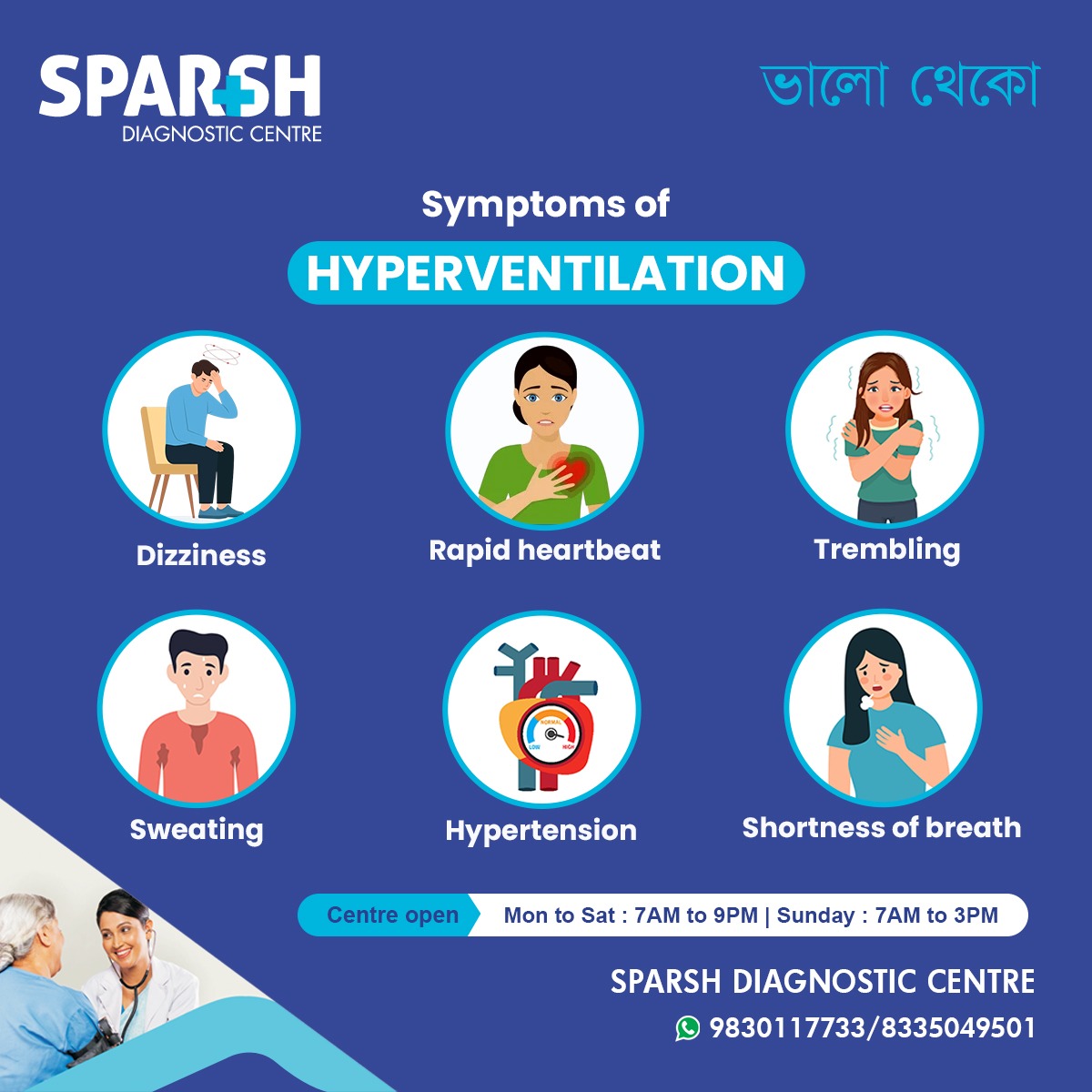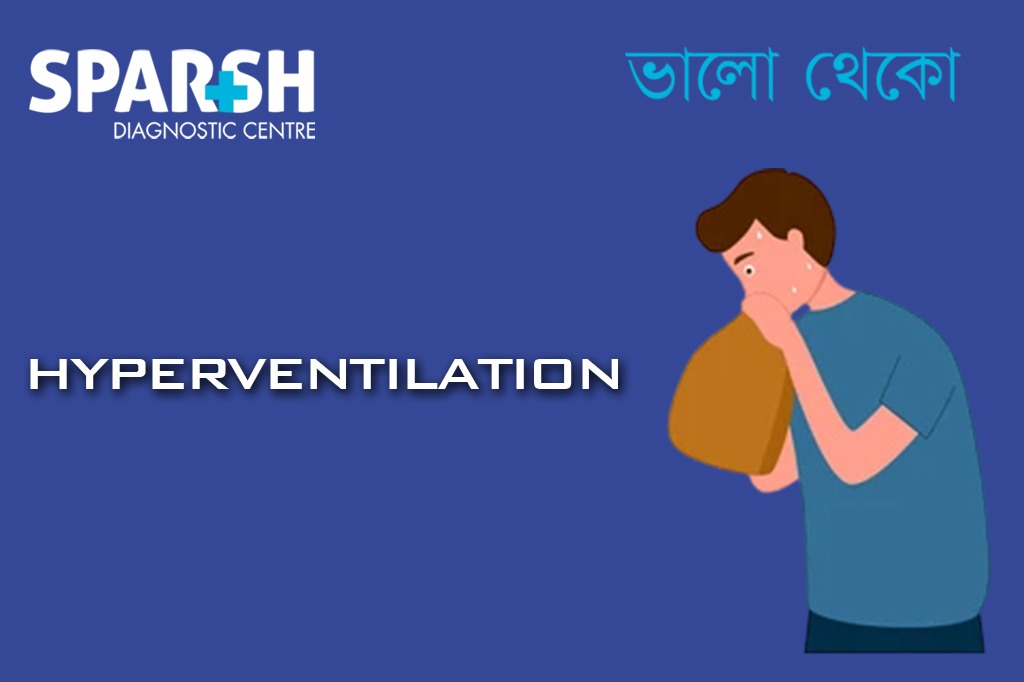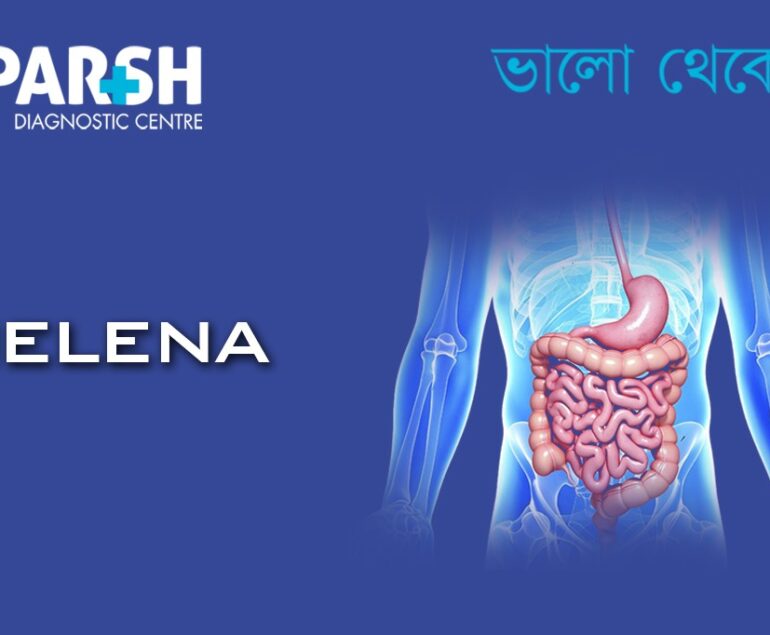Hyperventilation, commonly known as overbreathing, occurs when you breathe faster or deeper than necessary, disrupting the balance of oxygen and carbon dioxide in your blood. This can lead to symptoms like dizziness, shortness of breath, and rapid heartbeat—often mistaken for cardiac or neurological issues.
While occasional hyperventilation may be harmless, chronic or recurrent episodes can signal underlying medical or psychological conditions that require attention.
Why Does Hyperventilation Happen?
Hyperventilation can be triggered by various factors, broadly categorized into physiological, psychological, and environmental causes.
1. Physiological Causes
- Fever or infection
- Lung diseases (e.g., asthma, COPD)
- High altitude exposure
- Metabolic acidosis
2. Psychological Triggers
- Anxiety or panic attacks
- Stress or emotional trauma
- Phobias or PTSD
3. Environmental Factors
- Poor ventilation or confined spaces
- Excessive exercise without proper breathing
- Exposure to toxins or allergens
Common Symptoms of Hyperventilation
Recognizing the symptoms early can help prevent complications. Key signs include:
| Symptom | Description |
|---|---|
| Dizziness | Feeling lightheaded or faint due to reduced cerebral blood flow |
| Rapid Heartbeat | Palpitations or pounding heart sensation |
| Trembling | Shaking or muscle twitching due to low carbon dioxide levels |
| Sweating | Cold sweats or clamminess, often linked to anxiety |
| Hypertension | Elevated blood pressure during episodes |
| Shortness of Breath | Difficulty breathing despite fast breathing rate |
| Chest Tightness | Sensation of pressure or discomfort in the chest |
| Numbness or Tingling | Especially in fingers, toes, or around the mouth |
| Visual Disturbances | Blurred vision or tunnel vision during acute episodes |

How is Hyperventilation Diagnosed?
A multi-modal approach to diagnosing hyperventilation is required to rule out other conditions.
Clinical Evaluation
- Detailed history of symptoms, triggers, and frequency
- Assessment of anxiety or panic disorders
Diagnostic Tests
- Arterial Blood Gas (ABG): Measures oxygen and carbon dioxide levels
- Pulmonary Function Test (PFT): Assesses lung capacity and airflow
- Electrocardiogram (ECG): Rules out cardiac causes of palpitations
- Chest X-ray or CT Scan: Detects structural lung abnormalities
- Capnography: Monitors carbon dioxide levels during breathing
Treatment & Management of Hyperventilation
Treatment depends on the underlying cause. At Sparsh, we offer personalized care plans that may include:
1. Breathing Retraining
- Diaphragmatic breathing exercises
- Pursed-lip breathing
- Guided breath-holding techniques
2. Cognitive Behavioral Therapy (CBT)
- Helps manage anxiety and panic disorders
- Teaches coping strategies and relaxation techniques
3. Medication
- Anti-anxiety medications (if prescribed by a psychiatrist)
- Bronchodilators for asthma-related hyperventilation
- Beta-blockers for heart rate control (under supervision)
4. Lifestyle Modifications
- Regular physical activity with proper breathing
- Avoidance of stimulants like caffeine
- Mindfulness and meditation practices
Why Choose Sparsh Diagnostic Centre?
Sparsh Diagnostic Centre is committed to accurate diagnosis and compassionate care. Here’s what sets us apart:
- Advanced diagnostic tools (ABG, PFT, ECG, imaging)
- Experienced pulmonologists and psychiatrists
- Personalized treatment plans
- Multilingual support and regional outreach
- Open 7AM–9PM (Mon–Sat), 7AM–3PM (Sun)
Contact us: 9830117733 / 8335049501
Visit us: Sparsh Diagnostic Centre
Hyperventilation vs. Other Breathing Disorders
| Condition | Key Difference |
|---|---|
| Asthma | Involves airway inflammation and wheezing |
| COPD | Chronic airflow limitation, often with mucus production |
| Panic Attack | Psychological trigger with hyperventilation as a symptom |
| Pulmonary Embolism | Blood clot in lungs, often with chest pain and low oxygen |
| Hyperventilation Syndrome | Recurrent episodes without clear physical cause, often anxiety-related |
Frequently Asked Questions (FAQs)
Q1. Is hyperventilation dangerous?
While occasional hyperventilation may be harmless, chronic episodes can lead to complications like fainting, panic attacks, or misdiagnosis of heart conditions. It’s important to seek medical evaluation.
Q2. Can anxiety cause hyperventilation?
Yes. Anxiety and panic disorders are among the most common psychological triggers of hyperventilation. Breathing retraining and therapy can help manage it effectively.
Q3. How do I stop hyperventilating during a panic attack?
Try slow, deep breathing through your nose, hold for a few seconds, and exhale slowly through pursed lips. Practicing this regularly can reduce the intensity of future episodes.
Q4. What tests are done to diagnose hyperventilation?
Tests include arterial blood gas analysis, pulmonary function tests, ECG, chest imaging, and capnography. These help rule out other conditions and confirm the diagnosis.
Q5. Can children experience hyperventilation?
Yes. Children may hyperventilate due to anxiety, fever, or respiratory infections. Pediatric evaluation is essential to determine the cause and provide appropriate care.
Q6. Is hyperventilation linked to heart disease?
Not directly. However, symptoms like chest pain and rapid heartbeat may mimic cardiac issues. Diagnostic tests help differentiate between the two.
Q7. What is Hyperventilation Syndrome?
It’s a condition where individuals experience frequent episodes of hyperventilation without a clear physical cause, often linked to stress or anxiety.
Hyperventilation is more than just fast breathing—it’s a complex condition that can affect your physical and emotional well-being. At Sparsh Diagnostic Centre, we believe in early diagnosis, empathetic care, and holistic treatment. Whether you’re experiencing unexplained dizziness, shortness of breath, or anxiety-related symptoms, our team is here to help you breathe easy again.
#BhaloTheko
Disclaimer:
No content on this site, regardless of date, should ever be used as a substitute for direct medical advice from your doctor or other qualified clinician.

![]()






[…] Alkalosis occurs when excessive exhalation of carbon dioxide (hyperventilation) leads to a reduction in the partial pressure of CO₂ (PaCO₂). Carbon dioxide helps regulate […]
[…] Hyperventilation (to reduce CO₂) […]
[…] Hyperventilation: Breathing too rapidly (often due to anxiety or panic) can alter carbon dioxide levels in the blood, leading to palpitations. […]
[…] disorder (PTSD) can manifest physically, with dizziness being a prominent symptom. Anxiety-related hyperventilation or panic attacks can also cause faintness or […]
[…] anxiety itself doesn’t reduce oxygen levels, it can lead to hyperventilation, which might cause symptoms resembling […]